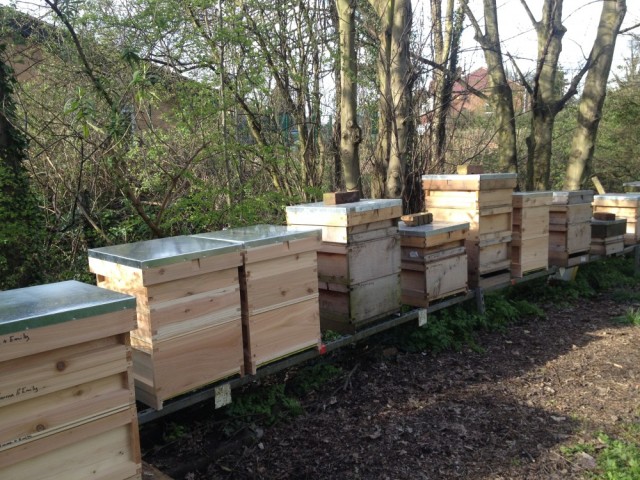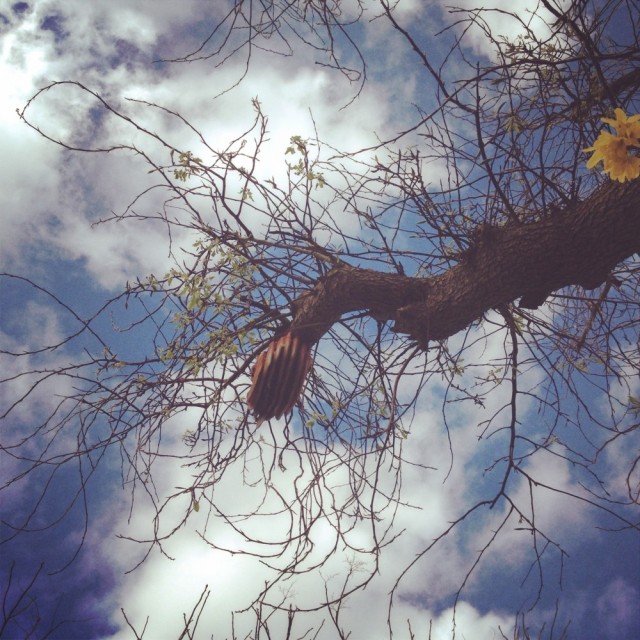When I walked into the apiary, Albert said to me “I hear you’ve gone commercial”. He pointed past his shoulder, where a row of three new hives had been set up next to our existing three, all six neatly labelled “Emily and Emma”. Emma had been busy!
Our new empire consists of the first six hives you see on the left. The newer hives are obvious as they are all light and unstained. Emma said some of our bees came out to check ’em out, plus a queen bumblebee was nosing around! She’s blogged about her hard work at ‘A string of warm days and daffodils‘, accompanied by some beautiful cheery photos of the apiary and daffodils.
We are now ready to do our comb changes. I must remember to mark our new frames with the month and date, plus 1-10 so that we know which order they started off in. This makes it harder to put them back in the wrong order when inspecting. Must also remember to, er, make them. Kinda haven’t done that yet.
During tea and cake chatting I met a very enthusiastic new beekeeper. He had only just visited the apiary for the first time, but had already joined the association, bought a smoker and bought a bee suit. He also plans to get two to three hives soon! I was a bit worried that he’s rushing into things too quickly, but he said his grandfather was a beekeeper so perhaps he’s picked up a few tips from him.
“Who’s happy being up a ladder?” asked John Chapple. Tom volunteered himself; the reason was that our Chairman Clare Vernon has a neighbour with bees living in their tree. The house is currently being done up and the neighbour may not be happy to move back in with the bees still there. The most amazing thing is that these bees aren’t nesting in a hole but just in comb hanging from the tree.
Tom, Clare, Albert and I went to have a look so that Tom could make plans to remove the bees. On the concrete path leading up to the garden were some unmoving bees, which probably landed there and then got too cold to fly off again. They were the darkest honeybees I’ve ever seen, black in every single abdomen segment. I placed two dead ones in my pocket to study at home.
When we got inside the garden (the builders let us in) I gasped when I saw the comb up the tree at the end. It was magnificent, seven combs graduated in size hanging high up. The end comb was marked brown so had obviously contained brood at some point. They arrived as a swarm last summer; Clare said that when the colony was at its largest the comb was completely hidden and she could just see a ball of bees in the tree. There were a few bees entering the comb but not many, so Tom thought maybe it’s just being robbed out now – that would be sad if such a hardy colony has died out.
On our way out I picked up a black bee which was moving slightly on the concrete path and blew hot air on her. She soon perked up and began walking around on my hand. I left her on a plant. When I got home I removed the two dead bees from my pocket, only to find to my horror that they had come alive again in the warmth. Sadly one had stung my coat and had her sting hanging out, while the other had two damaged legs. I had to put them out of their misery – I won’t assume that unmoving bees are dead again. Poor wee things.




Emily, hello from New Hampshire USA. Magnificent comb and photo! Thank you for your efforts here. They are such a delight to read. I’m in my sixth year beekeeping with three apiaries and thirteen hives and feel I have so much catching up to do reading all you’ve done in just three years! Thanks also for an opportunity to dig out my Mother’s old cook book for a tea cakes recipe. For now on, my beekeeping must include a spot of tea, obviously the magic ingredient for all good beekeeping practices.
LikeLike
Hi Athena, thank you that is very kind of you. But with thirteen hives I’m sure you can’t learn anything from me! Tea cakes and tea is definitely essential for recharging after beekeeping.
LikeLike
That free-hanging hive is amazing!
LikeLike
It is indeed a thing of beauty!
LikeLike
That is a good lesson, Emily. An unmoving bee may not be dead. I wish your bees a healthy, productive year. You too!!!
LikeLike
Thanks, and you! Yes, I felt so guilty when I saw the damaged bees.
LikeLike
Congratulations on the expansion! Emily, I see the hives are left unpainted…is that customary in the UK?
LikeLike
Yes, that’s normal, all the hives in the apiary are unpainted. Emma and I plan to get some bee friendly paint and put some patterns on ours this summer.
LikeLike
I was just going to comment of the closeness of the hives and bees drifting! Definitely a visual difference between hives (colour / shape) would help the bees. I have just finished creating some coloured shapes myself to stick on my hives.
Expanding is great, hope you find enough time to manage all those hives! 😉
LikeLike
Thanks for the advice – what coloured shapes have you gone for?
LikeLike
Circle, triangle, Cross, basically looked through the shapes available in clip art of MS Word and chose some.
LikeLike
I never knew that bees would make comb out in the open air. It does not seem the best idea to be so unprotected, I can’t see them surviving a normal UK winter. Are there many different colours and varieties of honey bees in the UK, I remember you talking about the yellow Italian ones someone has in your apiary? Did honey bees once live wild in the forests in the UK?
LikeLike
It may be that they couldn’t find a better site, hollow trees are in short supply. The tree is south facing. This winter has been unusually mild, although there were some strong gales which the comb withstood well.
I’m not sure how long honey bees have lived in the UK, but certainly they’ve been here a long time. They would have been kept by monks and villagers as well as living wild in woods and forests, as a few still do now. The original British subspecies of Apis Mellifera were said to be very dark. So many different subspecies have been imported from all around the world in recent times that I suspect most honeybees are mongrels, except when beekeepers buy queens direct from specialist breeders.
LikeLike
Mostly I see the dark forms in my garden but I often see ones with an orange band at the top of their abdomen. I watch them and wonder where they come from.
LikeLike
It’s unlikely but possible that they all come from the same colony, as half-sisters can have variations in colouring from their different drone dads.
LikeLike
Interesting!
LikeLike
Wow that is amazing that it survived the winter in that location.
I had a similar thing happen to me with suspected dead Bees coming back to life, it must be a survival method. I once brought some bees in that looked dead on the ground to photograph and with the light of the camera, these little zombie bees came back to life.
I took them outside and they flew off, hopefully to their own hives after a near death experience in the wild.
See ya…Gary
LikeLike
A happy ending!
LikeLike
Wow, that comb is impressive. When we first started with bees, it was suggested that we get at least 2 hives to have something to compare and to not have ” all our eggs in one basket” if we had trouble. Good luck with the Empire!
LikeLike
Good advice, there are so many things that can go wrong and it’s always handy to have a spare colony, gives you many more options.
LikeLike
Shiny! . . . and hopefully you know what that means.
LikeLike
Gorram right!
LikeLike
Pingback: A string of warm days and daffodils | Miss Apis Mellifera
Sounds like the bee adventures only just got started after tea this weekend! Love the pics of comb in the tree 🙂
LikeLike
Shame you missed it, you would have got better photos I’m sure! See you for more tea Saturday 🙂
LikeLike
Wow.. That free hanging hive is amazing but please don’t leave us hanging. Was the colony transferred to a hive, was it still viable? I must know 🙂
LikeLike
Well, I don’t know myself. It depends on whether the owner of the house depends to go ahead with having it removed, then Thomas can go round with a ladder. All will be revealed in time 🙂
LikeLike
fascinating pictures!
LikeLike
It was quite a sight to see, a rare and gorgeous thing.
LikeLike
That made me laugh…Shiny indeed. Ah, I miss Firefly! But seriously – wonderful pictures, really interesting to see how the bees make their comb in the wild, as it were. I used to live in Thailand and there you’d sometimes see a thin rope latter disappearing up high into the canopy of a huge tree – usually a sign that there was a hive far above you, where the bees were nesting out in the open. But they were always very, very high up, so all I could see from the ground was just a dark smudge, really. Lovely to see the hive up close like this.
LikeLike
Wish I’d had a proper camera with me so I could have zoomed in! Your time in Thailand sounds fascinating. Did you see bees closer up on the flowers?
LikeLike
Wonderful combs, a really exciting work of art. When full those combs could have been suspending 20 or so pounds of warm honey and brood above our heads,in high winds, all glued on to the swaying branch with wax…
Up and safety clipped to a well secured ladder, cutting the combs off into a cardboard box,, is where I would use my puffing-a-large-cigar hands-free technique !!!
If the box is then left on a stepladder immediately under the original position,if they are queenright,, all the bees should return that night and could be moved to another site.
LikeLike
I often see photos of European beekeepers puffing a large cigar as a smoker! That’s a good tip about leaving the box on the stepladder. Tom is planning to cut the combs out and fix them into hollow frames if there are any bees left to save.
LikeLike
So fascinating & beautiful!
We just had two swarm attacks here. One man died and another person received over 1000 stings. I think it’s the Africanized. I had a swarm last year, part like the Red Sea around me. I was thrilled out of my gourd and didn’t have time to be think. I just stood still. Mesmerized~
LikeLike
That’s very sad about the attacks. The odd thing is that swarming bees are usually very gentle – they have no nest to defend and they’ve filled up with honey, so it’s more difficult for them to sting. The Africanized bees must think differently.
What an experience to be surrounded by a nice swarm though, very jealous! Where were you?
LikeLike
Sorry, omit the be. Also, the swarm make quite a din! They sounded like a low flying old bi-plane!
LikeLike
That wild comb is an astonishing sight! Not a thing one comes across every day…. RH
LikeLike
It really is, it’ll be fascinating to see it up closer if the owner does want Tom to take it down.
LikeLike